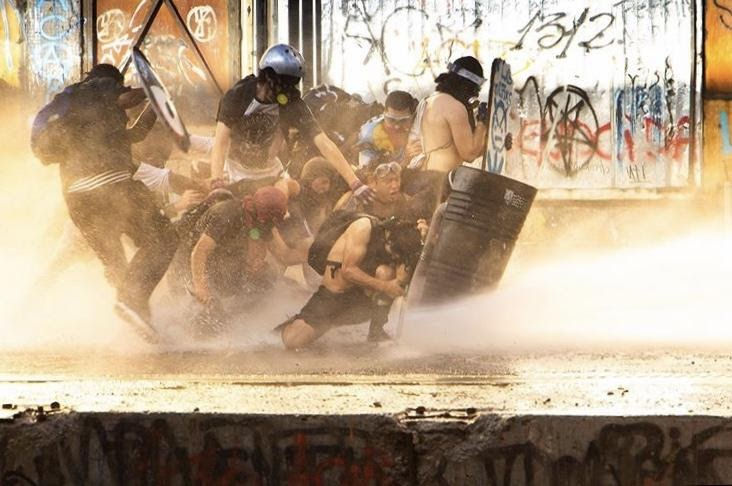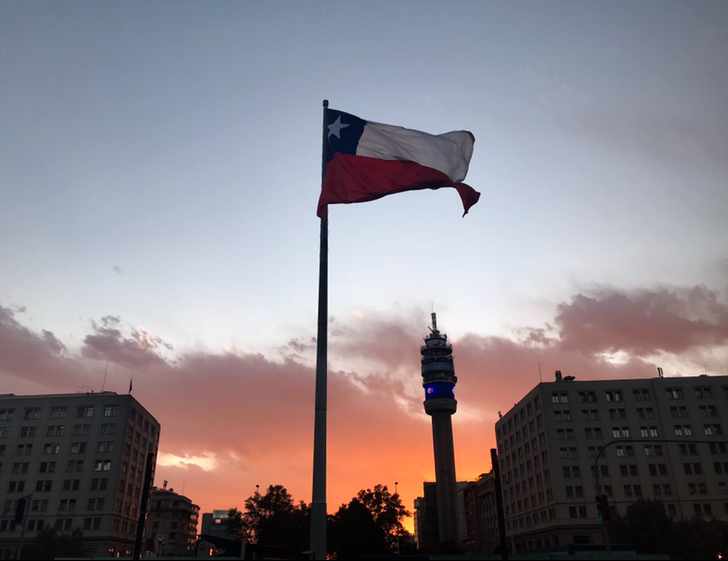Coronavirus – catalyst or obstacle for social change in Chile?
- The Eyes Journal

- Jun 30, 2020
- 6 min read
Augusto Pinochet’s military dictatorship came to an end in 1990, but the seventeen-year-long regime’s poignant legacy lives on as a visceral scar in Chile’s social fabric. However, its pursuit of neoliberal economic policy (a blend of liberal political views and economic growth through privatisation) has earned it the accolade of being Latin America’s success story. Yet, the steady rise of macro-economic indicators such as GDP and the employment rate, has failed to reflect the growing inequalities and discontent among the people, precipitating mass demonstrations and social unrest in October of last year. The unanswered demands for improved pensions, an increased minimum wage, and reduced inequality have resulted in thousands of arrests, damages and business losses totalling billions of dollars, and even some deaths.
Covid-19’s arrival in mid-March may have curtailed the protests, but it has made their cause all the more evident. The post-Covid space could provide a unique opportunity to carry out vital systemic change in the resource-rich country’s outdated structures and institutions. Will Chile succumb to the crisis’ fallout, or will it rise from the ashes?

General Pinochet successfully staged a coup against the socialist leader Salvador Allende, and tasked a group of Chicago University graduates, dubbed ‘The Chicago Boys’, with devising and implementing a new economic model. The chosen approach focused on significantly reducing government control of the economy via widespread deregulation and the privatisation of basic services such as healthcare, water, and pensions. Attracting foreign direct investment has also been a fundamental component of Chile’s rapid economic growth, enabled by accessibility for foreign investors and their exemption from sales and service taxes on the import of capital goods. GDP per capita grew and the emerging market became a member of the OECD (Organisation for Economic Co-operation and Development).
Today in the OECD, the average income of the richest 10% of the population is nine times higher than that of the poorest 10%. However, in Chile and Mexico, the income of the richest 10% is twenty-five times greater than that of the poorest. Half of the country’s active population earns the equivalent of US$550 or less per month, little more than the monthly minimum wage of US$414 (1). Moreover, many people receive a pension significantly below the minimum wage despite working for most of their lives (2). Bart Koning, 49, moved to the coastal town Valparaíso in 2007 and observes that “people cannot live off the pensions, it’s a fraction of what they used to earn.”
These social and economic inequalities boiled over on the 18th October 2019, after a CLP$30 peso (US$0.04) rise in the Santiago metro fare. This seemingly small increase represented a tipping point for the underlying issues and tensions, which had been festering since the dictatorship. Prior to the increase, Santiago’s metro fare had already represented a significantly higher proportion of the minimum wage (13.8%) than neighbouring capitals such as Lima (8.18%) and Buenos Aires (5.71%) (3). Antonia Godoy, a political science student, commented that initial resistance began with fare evasion as secondary school students jumped ticket turnstiles, “but by nightfall the first barricades were up, there were clashes with police, and the metro stations were burning.”

Non-violent protest through the medium of street art and music has also seen a resurgence, echoing a similar movement in the 70s during the Pinochet regime. Yet, the more traditional feminist and environmentalist content has recently morphed into images of blinded protestors – a tribute to those injured by projectiles and tear gas used by the police during the riots. Calls for Piñera’s resignation also adorn the murals, as disillusionment with the government and its handling of the protests continues to grow.
Partly driven by constitutional requirements, Chile’s government has experienced a regular swing from left to right-leaning governments which has prohibited a long-term coherent policy on issues such as civil rights and international investment.
Many citizens are hoping to see constitutional reform or even the enactment of an entirely new constitution – one which does not have its foundations in the painful collective memory of the dictatorship. This would likely include greater government involvement in the provision of basic goods and services, and an increased role for local government and municipalities. The move to postpone a referendum on a new constitution while opening schools and some businesses in a bid to restart the economy has been criticised as an evasion of democratic duty by some. A Financial Times poll indicated that the majority of the population do not wish to see a complete overhaul of Chile’s unique system.
Translator Nelly Alister, 55, and retired landlady María Levin, do not view constitutional reform as the solution to these problems at all, citing red tape and the more effective results available through, for example, directly addressing labour or pension-specific laws. Nelly contemplates more targeted changes to law and policy, stating that a new constitution would only serve its predominantly left-wing advocates in ‘not reminding them of Pinochet,’ rather than dealing with the issues at hand.
In contrast, Bart and Antonia tout the need for significant constitutional reform, the cornerstone of which, they say, must involve the de-centralisation of authority from the powers that be. This is partly a result of the federal system’s handling of the Covid crisis, which they argue has been ‘erratic’ and ‘confusing’. Yet, both are optimistic for Chile’s prospects after what is expected to be a worldwide economic slump. Antonia predicts that the virus’ role as a driver of political unrest, coupled with the ‘global impact’ of protests following George Floyd’s death at the hands of Minnesota police, will ‘definitely act as a catalyst’ for social change.
Covid has highlighted and exacerbated inequality, triggering anti-lockdown protests amongst the many people who live day-to-day across Latin America – the region with the worst economic inequality in the world. Levin states “the situation is critical, I have no income, zero pesos.”
In Santiago, and elsewhere on the continent, sporadic protests have persisted in spite of lockdown, but as the pandemic continues to worsen in the region, flouting of the lockdown rules is increasingly driven by financial desperation rather than political activism.

Bart comments that the key to economic recovery will be natural resources. Copper, which boasts anti-viral and anti-microbial properties, accounts for approximately 50% of Chile’s total exports, and the country was responsible for a quarter of global production in 2019. To date, official figures indicate a total drop equivalent to just 1% of the metal’s annual production, as demand continues in growing sectors such as renewable energy, electrical storage, and high technology. Nevertheless, the virus has impacted the mobility of staff to and from the mines and big companies such as Antofagasta (listed in London) have cut their recent dividend payments and limited their capital expenditure in order to preserve cash.
As the rest of the world recovers from the pandemic, in particular China, which accounts for 30% of Chilean exports, global demand is set to return. The industry had already been forecast to grow; a McKinsey Global Institute report from 2017 predicted a 43% rise in demand for copper over a fifteen-year period.
However, Chile would do well to diversify its economy and reduce its dependency on a single commodity if it is to confront its ingrained inequality. Otherwise the Andean nation risks perpetuating the monopolies of a few families who dominate the Chilean copper industry. This model fosters complacency and drives inequality, as typified by economies in the Middle East with their heavy dependency on crude oil – and Venezuela similarly until its recent crisis.
In spite of the pandemic’s unforeseen ramifications, Covid-19 has also served to test and expose weaknesses in governments throughout the world. In Chile, it has reconfirmed the ingrained political and economic divisions which have precluded a move towards social equality in the modern, democratic era. By coinciding with palpable social unrest, the post-Covid rebuild presents an opportunity for a profound systemic change in the country’s economic model and its dominant copper industry. Failure to enact such lasting change would mean Chile’s outdated monopolies and structures will simply continue to feed the economic polarity within the country.
With society paused at breaking point, Bart laments that “Chile cannot wait any longer.”
Author: Michael Knezevic
References
1. Laing Aislinn et al. (2019) ‘Explainer: Chile’s inequality challenge: What went wrong and can it be fixed? ’, Reuters, https://www.reuters.com/article/us-chile-protests-explainer-idUSKBN1X22RK
2. Cambero, Fabian (2020) ‘Chile’s Pinera proposes reform of pension system that has fuelled protests’, Reuters, https://www.reuters.com/article/us-chile-pensions/chiles-pinera-proposes-reform-of-pension-system-that-has-fueled-protests-idUSKBN1ZF075
3. Cádiz, Pablo (2019) ‘El metro más caro de Sudamérica? Esto gastan los chilenos en transporte (y qué pasa en el mundo)’, TELE13, https://www.t13.cl/noticia/nacional/evasion-masiva-metro-valor-pasaje-chile-mundo-sueldo-minimo
![2[1].jpg](https://static.wixstatic.com/media/5abadf_f310244424a443b29215dadb17bba49b~mv2.jpg/v1/crop/x_5,y_0,w_1069,h_1080/fill/w_101,h_102,al_c,q_80,usm_0.66_1.00_0.01,enc_avif,quality_auto/2%5B1%5D.jpg)






Comments